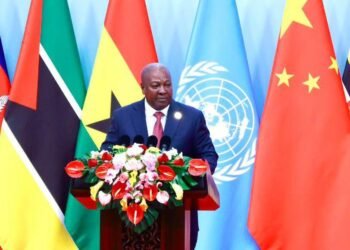The Chief Executive Officer (CEO) of the National Petroleum Authority (NPA), Dr. Mustapha Abdul Hamid, has reported significant strides in combating petroleum product diversion and smuggling in Ghana.
In a recent address, Dr. Hamid revealed that the NPA successfully retrieved 889,650 liters of petroleum products from diversion and smuggling gangs in 2023, highlighting the challenges and achievements within the sector.
The illicit activities of smuggling and diversion of petroleum products to unauthorized and unlicensed Petroleum Service Providers (PSPs) have emerged as a significant threat to the energy sector, posing serious economic, environmental, and security risks.
“Such supplies of petroleum products to unlicensed PSPs have fueled adulteration and contamination of petroleum product.”
Dr. Mustapha Abdul Hamid, Chief Executive Officer (CEO) of NPA
This nefarious practice not only undermines the integrity of the petroleum industry but also deprives governments of much-needed revenue, perpetuates corruption, and endangers public safety.
Dr. Hamid underscored the violations of the regulatory framework by several Petroleum Service Providers (PSPs) as a primary issue.
The CEO pointed out that falsified documents often accompanied these consignments, resulting in wrongful claims on the Unified Petroleum Price Fund (UPPF) and distorting national consumption statistics. Such fraudulent activities undermine the integrity of the petroleum sector and have necessitated stringent measures to safeguard it.
In addition to the diverted petroleum, Dr. Hamid highlighted the confiscation of 322,729 liters of smuggled petroleum products, including Automotive Gas Oil (AGO) and crude oil.
These products were seized from 12 specialized canoes, known locally as “dende,” along the shores of Sekondi-Takoradi, Prampram, and Tema.
“The Ghana Maritime Authority (GMA) and the Ghana Navy played pivotal roles in these operations, arresting the seacrafts with fictitious documentation regarding the source of the products.”
Dr. Mustapha Abdul Hamid, Chief Executive Officer (CEO) of NPA
Dr. Hamid commended the GMA and Ghana Navy for their collaborative efforts in protecting the public from the activities of these criminal elements. Their actions are a testament to the importance of inter-agency cooperation in maintaining the integrity of Ghana’s petroleum sector.
Growth and Economic Impact

Despite these challenges, Dr. Hamid noted the positive evolution of Ghana’s downstream petroleum sector. He described it as a vibrant and dynamic industry with increased private sector participation, contributing significantly to the country’s economic growth and development.
“We estimate that the sector’s monetary value is estimated to exceed GHC 71 billion, accounting for about 8.4 percent of Ghana’s Gross Domestic Product (GDP) in 2023. This figure reflects an average annual value of over GHS 35 billion over the past seven years.”
Dr. Mustapha Abdul Hamid, Chief Executive Officer (CEO) of NPA
The consumption of petroleum products also saw a notable increase, growing by 6.4 percent in 2023 to 4.49 million metric tons, following a 9.0 percent decrease in 2022. Dr. Hamid projected further recovery in 2024, with consumption expected to approach the peak of 4.64 million metric tons recorded in 2021.
Dr. Hamid noted that Ghana’s petroleum downstream industry has also become a key player in the regional market. Neighboring countries such as Mali, Niger, Cote D’Ivoire, Togo, and Burkina Faso are increasingly importing petroleum products from Ghana.
“The total volume of petroleum products re-exported and transited to these countries amounted to 385,154,100 liters in 2023. This increase in export volumes signifies the success of the NPA’s efforts to curb illicit fuel activities within the country.”
Dr. Mustapha Abdul Hamid, Chief Executive Officer (CEO) of NPA
“I am glad to announce that Senegal and Gambia have also begun importation of petroleum products from Ghana,” the NPA boss said.
Dr. Hamid expressed the NPA’s dedication to formulating and implementing innovative strategies and policies to ensure the industry’s efficiency and profitability. The NPA aims to provide value for money for consumers while maintaining stringent regulatory oversight to prevent illicit activities.
The smuggling and diversion of petroleum products to unauthorized PSPs represent a grave threat to the energy sector that demands urgent and concerted action from all stakeholders.
Through rigorous enforcement of regulations and strategic collaborations, the NPA has made significant strides in protecting the integrity of the sector. The continued growth and expansion of Ghana’s downstream petroleum industry not only contribute to the national economy but also enhance the country’s standing as a key player in the regional petroleum market.
READ ALSO: Zelenskyy Takes Aim At Orban





















